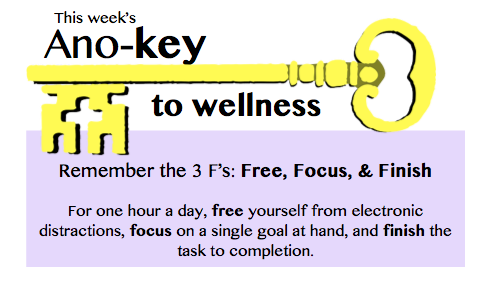LiveWell: The Misconception of Multitasking

Open up your math book; check your email. Flip to a blank page in your notebook; reply to the text message you just received. Do your first math problem; refresh your Facebook newsfeed.
This continuous cycle resembles the everyday routine of the average high school student. We’ve heard over and over again that multitasking is inefficient and wasteful – a mere detriment to productivity; and yet, we still do it, day after day, week after week.
We trick ourselves into thinking that we are being productive by doing many things at once, when, we are actually hindering our progress. We inevitably fall into the deceiving trap of multitasking, often taking hours to finish a task that could have been completed in minutes.
Multitasking produces a lag time between responsibilities that makes it hard for our brains to function at their full potentials. According to a study conducted by the Center for Brain Health, concentrating on one task at a time renders the greatest success rates. While this form of work is pervasively advocated, is it truly practical?
Last week, I tested the theory one evening after school. I shut down my email, phone, and Facebook account, and made a list of tasks that I needed to complete. Then, I tried my hardest to focus on each task with my full attention and without any distractions.
I finished all of my homework early that day, and definitely felt more organized than before. But, unfortunately, I did slip up; I sent a few text messages to friends and listened to some music throughout the course of the night. But, these blunders led me to new conclusion.
Yes, ideally, it would be great if we had the capacity to single-task without diverting our attention to anything else. But, the truth is, this is frankly unrealistic.
The fact of the matter is that multitasking is ultimately unavoidable due to the nature of our modern generation. With so many variations of new technology – text messaging, cell phones, email, etc. – it is difficult to completely block these interferences from our lives; they have become entwined with our daily routine.
The key is limiting the extent of the multitasking that we engage in. Deactivating unnecessary distractions, such as Facebook and Instagram, for designated amounts of “work time” will provide the initial steps towards efficiency and single tasking. In order to be more successful in the long run, we must become more aware of the relationship between our intended goals and our concrete actions.
Anokhi Saklecha (12) is the Global Editor for the Winged Post. She has been in the journalism program for the past three years. She loves the creativity,...


















![“[Building nerf blasters] became this outlet of creativity for me that hasn't been matched by anything else. The process [of] making a build complete to your desire is such a painstakingly difficult process, but I've had to learn from [the skills needed from] soldering to proper painting. There's so many different options for everything, if you think about it, it exists. The best part is [that] if it doesn't exist, you can build it yourself," Ishaan Parate said.](https://harkeraquila.com/wp-content/uploads/2022/08/DSC_8149-900x604.jpg)




![“When I came into high school, I was ready to be a follower. But DECA was a game changer for me. It helped me overcome my fear of public speaking, and it's played such a major role in who I've become today. To be able to successfully lead a chapter of 150 students, an officer team and be one of the upperclassmen I once really admired is something I'm [really] proud of,” Anvitha Tummala ('21) said.](https://harkeraquila.com/wp-content/uploads/2021/07/Screen-Shot-2021-07-25-at-9.50.05-AM-900x594.png)







![“I think getting up in the morning and having a sense of purpose [is exciting]. I think without a certain amount of drive, life is kind of obsolete and mundane, and I think having that every single day is what makes each day unique and kind of makes life exciting,” Neymika Jain (12) said.](https://harkeraquila.com/wp-content/uploads/2017/06/Screen-Shot-2017-06-03-at-4.54.16-PM.png)








![“My slogan is ‘slow feet, don’t eat, and I’m hungry.’ You need to run fast to get where you are–you aren't going to get those championships if you aren't fast,” Angel Cervantes (12) said. “I want to do well in school on my tests and in track and win championships for my team. I live by that, [and] I can do that anywhere: in the classroom or on the field.”](https://harkeraquila.com/wp-content/uploads/2018/06/DSC5146-900x601.jpg)
![“[Volleyball has] taught me how to fall correctly, and another thing it taught is that you don’t have to be the best at something to be good at it. If you just hit the ball in a smart way, then it still scores points and you’re good at it. You could be a background player and still make a much bigger impact on the team than you would think,” Anya Gert (’20) said.](https://harkeraquila.com/wp-content/uploads/2020/06/AnnaGert_JinTuan_HoHPhotoEdited-600x900.jpeg)

![“I'm not nearly there yet, but [my confidence has] definitely been getting better since I was pretty shy and timid coming into Harker my freshman year. I know that there's a lot of people that are really confident in what they do, and I really admire them. Everyone's so driven and that has really pushed me to kind of try to find my own place in high school and be more confident,” Alyssa Huang (’20) said.](https://harkeraquila.com/wp-content/uploads/2020/06/AlyssaHuang_EmilyChen_HoHPhoto-900x749.jpeg)


